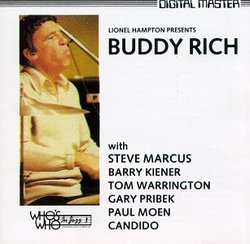| All Artists: Buddy Rich Title: Hampton Presents Buddy Rich Members Wishing: 0 Total Copies: 0 Label: Who's Who in Jazz Release Date: 4/4/2000 Genres: Jazz, Pop Style: Swing Jazz Number of Discs: 1 SwapaCD Credits: 1 UPC: 010592210626 |
Search - Buddy Rich :: Hampton Presents Buddy Rich
 | Buddy Rich Hampton Presents Buddy Rich Genres: Jazz, Pop
In 1977, when this recording was made, Buddy Rich had his own exciting band crammed full of young talent. Lionel Hampton, with whom Rich had shared many JATP tours and record dates, called him, and Buddy brought along f... more » |
Larger Image |
CD Details
Synopsis
Album Description
In 1977, when this recording was made, Buddy Rich had his own exciting band crammed full of young talent. Lionel Hampton, with whom Rich had shared many JATP tours and record dates, called him, and Buddy brought along four of his sidemen, Steve Marcus, Gary Pribek, Barry Kiener, and Tom Warrington. Hampton brought in his own tenor soloist and arranger, Paul Moen, and invited along the talented Cuban- born conga drummer Candido Camero. It would have been easy for this impromptu octet of musicians to have busked their way through familiar standards such as "In a Mellotone" and "Flying Home." In fact the young saxophonists were united in an admiration for the work of the late John Coltrane and two of his most exciting, if complex, earlier works were taped. "Moment's Notice" was first recorded by Coltrane almost exactly 20 years before the Hampton- Rich date for the Blue Note album "Blue Train." "Giant Steps" was the title tune on Coltrane's first album for the Atlantic label. "Buddy's Cherokee" has an extended, freely improvised vibraphone and drums introduction before Ray Noble's tune appears. Billy Strayhorn's "Take the 'A' Train" features vibes, conga drum, and the rhythm section as does the ballad "I'll Never be the Same" on which Rich displays his mastery of the brushes. "Buddy's Rock" has the now-familiar broken rhythmic figure of contemporary rock music and has solos from Hamp, Barry Kiener, Paul Moen, and a fade out on Tom Warrington's bass solo. Moen is again the only saxist on "My Funny Valentine," a beautiful ballad played here at slow tempo and again with Buddy Rich's brushes contributing masterfully but without too much volume. Paul Moen wrote and arranged the closing "Latin Silk" but the featured solo saxophone here is the soprano of Steve Marcus. Here is a skillful blend of youth and experience with Lionel Hampton and Buddy Rich showing that, despite the difference in years, they could come to terms with the musical styles of their sidemen. With Buddy now taken from us, the number of true jazz giants dwindles and it is a sobering thought that Rich, during his lifetime, worked and recorded with the widest possible range of stylists, from Art Tatum to Thelonius Monk, from Coleman Hawkins to Charlie Parker and from Gene Krupa to Max Roach. How many of today's jazzmen can lay claim to such catholic taste?

 Track Listings (8) - Disc #1
Track Listings (8) - Disc #1